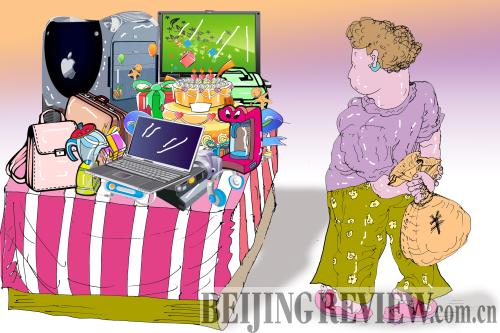|
 |
|
(LI SHIGONG) |
Thrift has been a cherished value for individuals and the country throughout Chinese history. But as the economic rebalancing comes to rely more on consumption instead of exports and investments, the frugalness can be more of a stumbling block.
Guo Tianyong, a banking professor with the Central University of Finance and Economics, told Beijing Review that the conservatism is partly due to a low level of credit availability, which makes it difficult for consumers to spend beyond their income.
"Surely this still depends on how big an appetite one has for debt," said Guo. "Some people simply won't spend money that they don't have."
Saving for the future
Chinese families tighten their wallets when wages fail to keep up with soaring asset prices even during boom times. A lack of sufficient unemployment and health care benefits has forced many to put money in the banks. Adding to these pressures is the realization that Chinese consumers cannot count on the stock market to finance their retirement, said Guo.
With an insecure future in mind, many Chinese must cobble together their own safety nets. He Shan, a 26-year-old editor of a news website based in Beijing living with her husband who is a government civil servant, has taken the matter of ensuring financial security into her own hands.
In the two years since they started their first jobs, the young couple has placed the bulk of their salaries in a savings account and tried to cut back on unnecessary expenditures. Like many other families, they seldom splurge their money on fancy luxuries and favor more economical options in their daily lives, like eating at home instead of dining out.
"Somehow I feel a little insecure about the future," she said. "You don't know when you may lose your job or get in an accident."
He credits her financial anxiety to growing up in a less affluent family, where she learned to always prepare for a "rainy day," she said.
"Also, my husband's parents do not have a pension fund, so we have to regularly wire them some money," she added.
Like many other young women, He often goes shopping as a preferred leisure activity. But she said she only makes a purchase if the price was appropriate or a generous discount was being offered.
"I have badly wanted an iPhone since it was introduced onto the mainland, but it is way too expensive," she said. "I'll just wait until the price goes down."
Despite a tight budget, He does not need to watch every penny. Occasionally, she will treat herself to something special, which has made life more enjoyable. "Last month I paid around 5,000 yuan ($731.5) for a single-lens reflex camera as I grow increasingly interested in photography," she said.
As the financial crisis extracts a toll on the world economy, even the most profligate spenders in America are rediscovering the virtue of saving in the midst of the financial crisis. In China, many are doing the same for different reasons.
| 